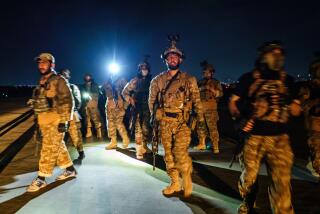A Stronger Afghanistan
- Share via
For many Americans who knew nothing of this nation until it swooshed into the national consciousness after 9/11 as a haven for terrorists, Afghanistan has been considered anything but democratic. In fact, from 1963 to 1973, Afghanistan had a constitution, elections and at least a semblance of representative government under a constitutional monarchy. But a cousin ousted the king in a coup and set the landlocked country on a course of upheaval that included the Soviet invasion and rule by the Taliban, protectors of Al Qaeda.
More than two years after the U.S. invasion toppled the Taliban, 502 Afghan delegates agreed Sunday to a new constitution designed to lead to presidential and parliamentary elections this year or next that will push the country further toward democracy. The constitutional convention lasted three weeks, longer than expected, because of heated debate that exposed the dangerous fault lines of ethnic and religious rivalries Afghans must confront. But the good ending to the session should not obscure the need for continued vigilance and assistance.
The convention was most remarkable for the role that women played. After years of being banned from schools and workplaces to adhere to the Taliban’s perverted interpretation of Islam, women are recognized under the new constitution as equal citizens. Further, it gives them 25% of the seats in the lower house of parliament. Men aligned to warlords tried to legislate second-class citizenship for women but failed, faced down by women delegates.
Lakhdar Brahimi, the skilled diplomat who is U.N. special representative for Afghanistan, deserves credit for pushing delegates to compromise and stop the convention from collapsing. So do diplomats from the U.N. and foreign embassies. Western nations have not met all their financial commitments to Afghanistan after pledging billions of dollars two years ago; foreign governments and the U.N. should get as much money as possible funneled through the Afghan government to enhance the feeling of a unified nation. President Bush’s demand that U.S. aid get a road built from Kabul to Kandahar was fulfilled last month and was noted by many delegates.
Security remains a problem, especially along the border with Pakistan. Outside troops are still necessary. Brahimi says the absence of a police force, army and judiciary will make it difficult to implement the constitution. The Afghan government and other nations recognize those problems; Germany is helping train police, and the U.S. has been working to build an army. Foreign aid, if spent properly, can show Afghans roads, schools and other benefits of withdrawing support from warlords and opium producers. The new constitution strengthens President Hamid Karzai’s government but does not enable it to go it alone.
More to Read
Sign up for Essential California
The most important California stories and recommendations in your inbox every morning.
You may occasionally receive promotional content from the Los Angeles Times.













